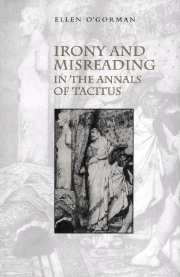Book contents
- Frontmatter
- Contents
- Dedication
- Preface
- 1 Introduction: irony, history, reading
- 2 Imperium sine fine:problems of definition in Annals 1
- 3 Germanicus and the reader in the text
- 4 Reading Tiberius at face value
- 5 Obliteration and the literate emperor
- 6 The empress's plot
- 7 Ghostwriting the emperor Nero
- 8 Conclusion: the end of history
- Bibliography
- General index
- Index locorum
6 - The empress's plot
Published online by Cambridge University Press: 30 September 2009
- Frontmatter
- Contents
- Dedication
- Preface
- 1 Introduction: irony, history, reading
- 2 Imperium sine fine:problems of definition in Annals 1
- 3 Germanicus and the reader in the text
- 4 Reading Tiberius at face value
- 5 Obliteration and the literate emperor
- 6 The empress's plot
- 7 Ghostwriting the emperor Nero
- 8 Conclusion: the end of history
- Bibliography
- General index
- Index locorum
Summary
Women have their uses for historians.
Ronald Syme, The Augustan AristocracyMight not one of the goals of what we so ambiguously call ‘women's studies’ be to call into question the oppressive effects of an epistemology based on the principle of a clear and nonambiguous distinction of subject and object of knowledge?
Jane Gallop, Reading LacanWe have already seen, in chapters three and five, how certain imperial women display themselves or are displayed as sites of recollection and anticipation, as monuments or embodied texts of dynastic history. In this chapter I will examine the woman's voice as a source of historical narrative, in particular the voices of the ‘successful’ empresses, Livia Augusta the mother of Tiberius, and the younger Agrippina, mother of Nero. As women who marry emperors and manœuvre their sons into the succession, these empresses’ plots can be read as strong narratives which both subvert and replace the prevailing trends of imperial history. The empress redirects the emplotment of her husband's reign, constructing a new teleology which points inevitably to her own son. The empress's ‘plot’, then, involves the manipulation and shaping of events, with the aim of presenting her son as the logical conclusion to her husband's reign. Consequently these female narratives have an especially charged relationship with Tacitus' own history, which blends with or diverges from their version of events.
- Type
- Chapter
- Information
- Irony and Misreading in the Annals of Tacitus , pp. 122 - 143Publisher: Cambridge University PressPrint publication year: 2000

